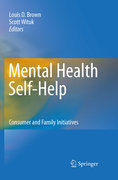
Mental health self-help: consumer and family initiatives
Brown, Louis D.
Wituk, Scott
Building on earlier patient-empowerment movements, consumer- and advocate-driven mental health self-help (MHSH) initiatives currently outnumber traditionalmental health organizations. At the same time, this apparent success raises significant questions about their short-term efficacy and their value to lasting recovery. Mental Health Self-Help assembles the state of the evidence on theeffectiveness of MHSH, beginning with the individual and larger social factors behind the expansion of consumer-directed services. Clearly organized and accessibly written, the book traces the development and evolution of MHSH as both alternative and adjunct to traditional mental health structures, offers research-based perspectives on the various forms of MHSH, and identifies potentialareas for consumer initiatives to work with—and help improve—mental health systems. Contributors weigh strengths and limitations, raise research and methodology questions, and discuss funding and training issues to give readers a deeper understanding of the field and an informed look at its future impact on mental health treatment. Individual chapters cover the spectrum of contemporary self-help initiatives in mental health, including: Online mutual aid groups. Consumer-run drop-in centers. Family and caregiver groups. Certified peer support specialists. Consumer advocacy initiatives. Technical assistance organizations. Professional/self-help collaborations. Mental Health Self-Help is a bedrock guide to an increasingly influential aspect of the mental health landscape.Researchers studying these initiatives from a variety of fields including community and clinical psychology, and public health—as well as clinicians, counselors, social workers, case managers, and policymakers—will find it an indispensable reference. Provides a comprehensive overview of the field with integrative chapters Chapters are written by leading researchers in the field Appeals to an international audience Balances research with practice, providing information that is relevant to the people who study, support, and implement these initiative INDICE: Introduction to mental health self-help.- Theoretical foundations of mental health self-help.- Mutual help groups for mental health problems: Anoverview and review of effectiveness.- An overview of mutual support groups for caregivers of Chinese people with schizophrenia and psychotic disorders: Research evidence on their processes and outcomes.- Consumer managed crisis residential services: A review of their processes and evidence base.- Self-help classes for caregivers of people with mental health problems: A review of the process and evidence behind NAMI’s Family to Family Education Program.- Buildingon the consumer-run drop-in center model: A review of research on consumer-run organizations in Kansas.- Professional partnerships with mental health self-help: Research on the costs and benefits.- Value dilemmas in mental health self-help: Implications for research, policy, and practice.- Supporting mental health self-help with technical assistance: A field-tested guide.- Consumers as providers in traditional community mental health centers: The certified peer specialist program in Kansas.
- ISBN: 978-1-4419-6252-2
- Editorial: Springer
- Encuadernacion: Cartoné
- Páginas: 262
- Fecha Publicación: 20/08/2010
- Nº Volúmenes: 1
- Idioma: Inglés
